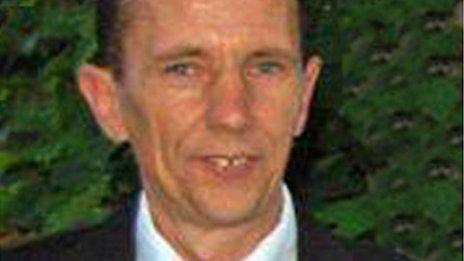Newport 'slavery' victim Darrell Simester speaks of ordeal
- Published
Darrell Simester describes being away from his family and appalling conditions he was kept in
It was a case that lifted the lid on modern day "slavery" in Wales. David Daniel Doran was jailed last month for forcing a vulnerable man to work unpaid at a farm near Newport. Now as BBC Wales' Week In Week Out programme delves further into the case, we take a look at some of the issues raised.
Victim Darrell Simester and his family speak about his ordeal for the first time
Police reveal vulnerable people are being targeted by traveller gangs to work for free
An anthropologist looks at why some travellers have "dependent servants"
A BBC reporter who was at the scene when Mr Simester was found recalls what happened

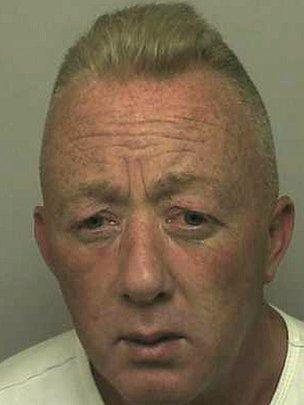
David Daniel Doran pleaded guilty midway through his trial at Cardiff Crown Court
Darrell's story:
A vulnerable man who was forced to work unpaid on a farm for 13 years has spoken for the first time about his ordeal.
Darrell Simester, 44, had been made to work for up to 16 hours a day at Cariad Farm in Peterstone near Newport, only ever having two days off.
He lived in appalling conditions, first in a rat-infested shed then a cold, squalid caravan, with only a horse trough to wash in and no soap or toothbrush.
David Daniel Doran, 42, who is from a traveller family, was jailed for four-and-a-half years after pleading guilty to forcing Mr Simester to perform forced or compulsory labour.
Speaking of the moment the farmer was sentenced at Cardiff Crown Court, Mr Simester told BBC Wales' Week In Week Out programme: "I wished he'd have got 13 years for what I'd gone through.
"Living in a shed, then a caravan, in them cold, dampy nights, freezing cold and frightened as well.
"In my heart every day I was thinking I wonder what happened to the rest of my family.
"Just kept going over in my head and in my stomach every day I was on that horrible, horrible farm."
Mr Simester's family, from Kidderminster in Worcestershire, believed he was missing after going on a trip to the seaside in Porthcawl in south Wales in 2000.
In fact, a member of the Doran family had picked him up at the side of a dual carriageway while travelling home and taken him to the family farm.
After his family finally tracked him down early last year following a social media campaign, they hardly recognised him, describing him as being a "broken man" who looked far older than his years.
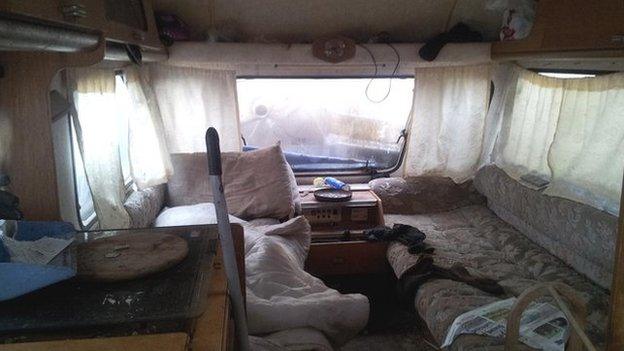
Mr Simester had to live in a dirty, squalid caravan at Cariad Farm
Mr Simester's father Tony, who had feared his son was dead, told Week In Week Out: "I went that's not my son; that's not my son.
"But as he got closer and looked up, cause he walked towards me with his head bowed, I could see it was my son."
His mother Jean added: "I just said 'You're coming home. You can't stay here'.
"And it was like winning the lottery: getting my arms around him and giving him a hug."
As he jailed Doran, Judge Neil Bidder QC told him the way he had treated his victim was "repellent and wrong" and "not much better than a slave".
Mr Simester, who was left malnourished, with a chest infection, a hernia and calloused feet after his time at Cariad Farm, is continuing to rebuild his life and now has his own place to live.
When asked what he wanted in the future, he replied: "A wife and a couple of kids."

Vulnerable targets:
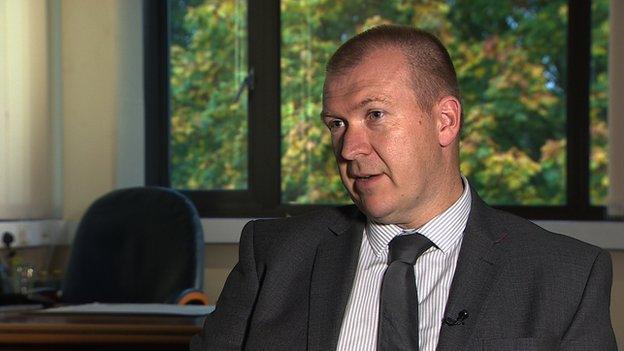
Det Supt Paul Griffiths said criminals from travelling communities were targeting vulnerable people
Police investigating the Simester case say a pattern is emerging across the UK involving criminals from the travelling community exploiting vulnerable adults for their own benefit.
Det Supt Paul Griffiths of Gwent Police said they were deliberately targeting vulnerable, often homeless men, at specific places and forcing them into labour.
"Whether they are shelters, park benches, or other locations where they would congregate but similarly those suspected of these offences would be able to target different people for their own means," added Det Supt Griffiths.
Michael Stewart, a social anthropologist who has worked and lived with traveller families, said most travellers treated their workers well, but in Mr Simester's case it was clearly exploitative and abusive.
"What's certainly true is that travellers are not highly thought of," said Mr Stewart, who says he does not speak for travellers but has studied them and tried to see things from their point of view.
Social anthropologist Michael Stewart has studied travellers for years
"Travellers are often despised, not many people would go and live in a travellers compound on a travellers site.
"So to some extent you could say the labour market is restricted... So travellers tend to pick up people who are less able to find a position in the mainstream labour market.
"Sometimes those relationships, it's quite clear from the court cases there have been, have become exploitative and abusive.
"In other occasions, in other places and in other families, those relationships can be protective and supportive."
He added: "It's certainly true that in some cases for traveller families having dependent servants who are non-travellers is a form of demonstrating wealth and status and achievement and you have the space to house these people, you have the social pulling power in a sense, that you're an attractive enough proposition."
David Phillips, chief executive of the South East Wales Race Equality Council, which speaks for traveller communities, said there were plenty of examples of homeless people choosing to live with and work for traveller families.
"We recognise that this is not what happened on this occasion and our communities are as horrified as everybody else at Mr Simester's treatment," said Mr Phillips.

Finding Darrell:
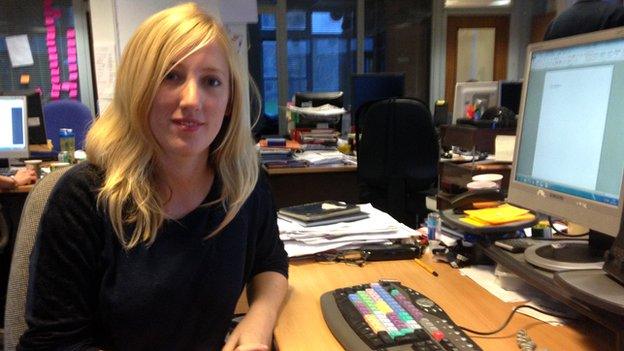
Clare Hutchinson was working at a local newspaper when she was contacted by Jean Simester
Clare Hutchinson is a researcher at Week In Week Out and has followed Mr Simester's story since he was found.
I first spoke to Darrell Simester's mum, Jean, in February 2013.
I worked at a local newspaper and she sent us a long and heartrending email explaining that she was looking for her son, who had been missing for 13 years. She believed he was in south Wales.
When I picked up the phone and spoke to her, I had little idea how far the story would go.
Jean was heartbroken and desperate for someone to help her family in their hunt for Darrell - a search that had already gone on for more than a decade and had involved dozens of meetings with police that always ended with officers telling her he was a "missing contact" - not a missing person.
In her words to me during that first phone call: "He's not a missing contact, he's my son."
Jean and her husband Tony described their son, who would now be 43, as "timid" and "easily-led". They also told me of their suspicions that he was being held against his will somewhere in Cardiff. He had gone on holiday with another family in August 2000, and after an argument had run away.
A few days later they heard from him: he was working on the roads. For eight years he would call a couple of times a year, often from withheld numbers, often with voices in the background telling him what to say.
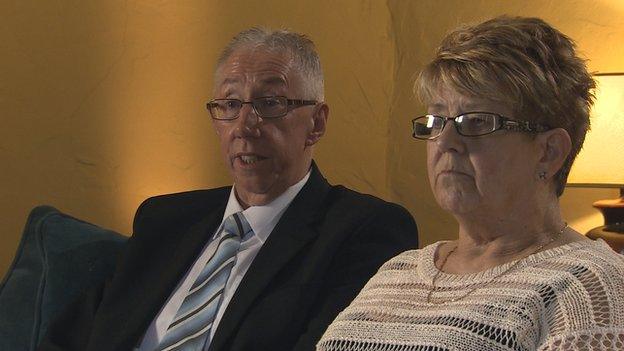
Tony and Jean Simester never gave up looking for their son and turned to the media for help
Then, in 2008, Darrell called his family at Christmas. He promised to speak to them again in the New Year - but that phone call never came.
We ran a story in the newspaper in which Jean and Tony made a desperate plea for anyone who recognised Darrell to come forward.
It was a last-ditch attempt after 13 years of searching but - incredibly - it paid off.
A few days later, Jean's mobile phone rang and the person at the other end told her they had seen Darrell working on a farm on the Gwent levels between Newport and Cardiff.
I was in work on a rainy morning in late February 2013 when I got a tearful phone call from Jean saying they may have found Darrell - and that they were on their way down to Cardiff.
I rushed out and met Jean, Tony and Darrell's younger brother Duncan outside Cariad Farm just as the police arrived.
The family had not known what to expect - or even whether the man would be their son. Duncan approached him first, but when Darrell told him he could not leave the farm the family were suspicious enough to call the police.
Officers arrived a short while later - and wearing torn, filthy clothes, a flat cap and carrying his worldly goods in a black bin bag, Darrell emerged from the farm.
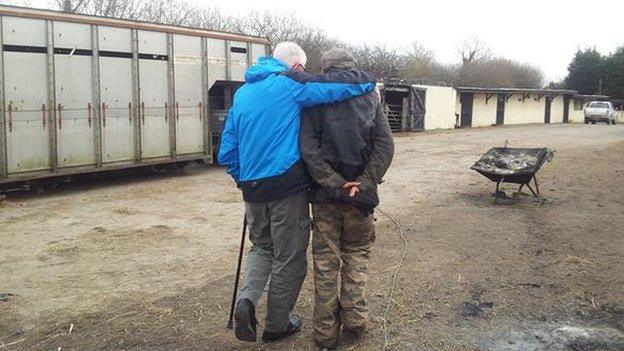
A Simester family photograph of the moment father and son were reunited at Cariad Farm
His face was dirty and furrowed with deep lines. In Tony's words, his son looked like an old man.
The reunion between the Simester family was emotional, and difficult to witness. As Darrell walked out of the farm's driveway, head bowed, Jean ran forward and hugged him. I later asked her what she said at that moment. She replied through tears, "I just said, you're coming home".
His dad and brother walked around the farm, taking photos of the dirty caravan in which he had been made to live.
A short while later, Darrell and his family got in their car and returned home to Kidderminster.
Over the following weeks and months I stayed in contact with the Simester family, speaking to Jean and Tony about Darrell's progress.
The first shock came when they got home and discovered the terrible condition he was in: a hernia on his groin the size of a football; a fungal infection that had turned the soles of his feet green; curvature of the spine and severe weight-loss.
Darrell would wake up every day at 6am, his dad said. He would fall asleep on the armchair in the evening, but jerk awake at the sound of a person walking into the room, or closing a door.
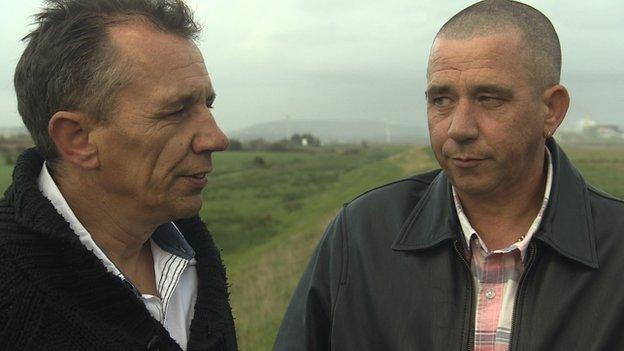
Darrell Simester, pictured with his brother Duncan, is now rebuilding his life
While his parents believe he had learning difficulties from a young age, he was now suffering deep psychological problems and has since been seeing a psychiatrist.
And while they have struggled, the family have continued to help him return to a normal life. Together they have been on holidays, on day trips to see his favourite football teams, held a homecoming party and - more recently - helped Darrell move into his new place.
We went to visit him for our programme, and Darrell showed us around with pride. There is a clock on the mantelpiece that used to belong to his grandmother; DVDs and books donated by well-wishers; and a Manchester United duvet on the spare bed.
His family have helped him develop routines for cleaning and cooking. When we visited a new kitchen had just been fitted - and Jean was planning to help her son make a cheesecake.
The court case was difficult for them all but, while they feel the four-and-a-half year sentence handed to David Daniel Doran was not enough, they are satisfied with the outcome.
As Tony said to me when we last spoke: "I've banned all talk of the last 13 years - we just want to look forward and talk about the years to come."
The way in which South Wales, West Mercia and Gwent police investigated Mr Simester's disappearance is now the subject of a supervised investigation by the Independent Police Complaints Commission.
All three forces have said they cannot comment while that investigation is continuing.
Week In, Week Out - 13 Years A Slave: Darrell's Story is on BBC1 Wales at 22:35 BST on Tuesday, 4 November.
- Published24 October 2014

- Published24 October 2014
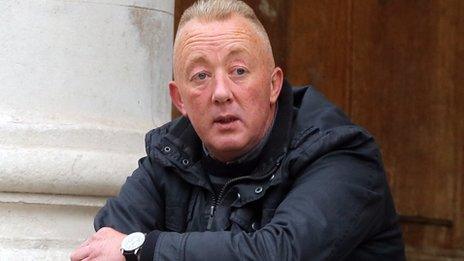
- Published24 October 2014

- Published24 October 2014
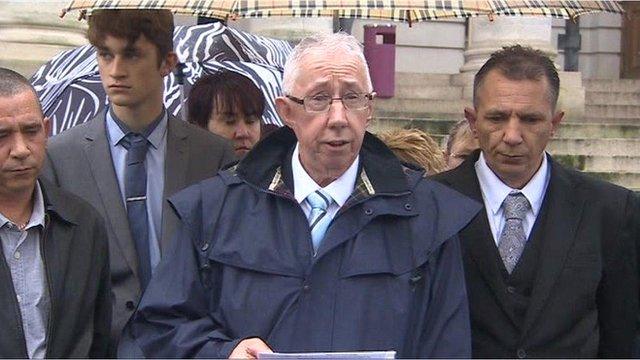
- Published8 October 2014

- Published3 October 2014
